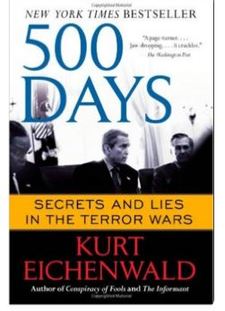|
Kurt Eichenwald is one of my favorite investigative journalists. His books include Conspiracy of Fools about Enron, Serpent on the Rock about the Purdential-Bache scandals and his best-known work, The Informant, which was made into a movie that starred Matt Damon. (It must be noted that though the movie was well done and tells the story entertainingly, the movie is done as a goofy comedy, almost a farce, and the book is not even remotely funny, except maybe when you cringe a few times in utter disbelief. It's a very serious story about a business scandal that destroys a man's life as he gets more and more involved with helping the feds by going undercover and gets carried away.) I just finished his most recent book -- though two years old, written in 2013 -- 500 Days: Secrets and Lies in the Terror Wars. And it's wonderful. Very different from his other books, which have been about the business world. This is pure politics, following the 500 days after the attacks on 9/11 (as well as a sort of prologue of a few months leading up to it). In most ways, 500 Days is an intentionally dispassionate books. He explains in the introduction that he's not attempting to point fingers, but rather describe as objectively as possible what happened as way.
And he is objective and even-handed. But it's difficult to read the book and, while admiring the intentions of many to keep the country safe, not be furious at how those goals too often got corrupted, most especially on his remarkable reporting on the decisions that lead to allowing torture and several innocent Canadians who had their lives pummeled for no reason other than over-zealousness. The research that Eichenwald presents is stunning, following stories from numerous perspectives -- including those of of the upper White House, the inner staff, the FBI and CIA, the military, three Canadians caught up in a horror story, and even the lives of terrorists, including Osama bin Laden. It's prodigious work. The book also includes a running account of a mostly-forgotten story of the time: anthrax poisonings, that were at first thought to be by terrorists, but turned out to be done by a mentally-trouble government scientist who was initially used by the FBI as their lead researcher in their investigation. But it's his writing about how all this lead to torture that stands out and can't help create fury in the reader, no matter how dispassionate the telling, no matter your perspective on the subject. I say that because, in part, the tale includes following those three innocent Canadians of Middle-Eastern descent. One, who was initially suspected of being a terrorist because a company truck he used had an old map in it left behind that showed an area where some government buildings were. And two of the men who were suspected, in part, because one of them made radios that were shipped to a company in Pakistan which were somewhat similar to radios that were used by al Qaeda, but no law officials bothered to check invoices to would have shown their destination. And then he and another man were observed by officers walking in a light mist, which for some reason was considered suspicious and therefore was described in investigation reports as a heavy rain -- which still, somehow was thought to be"suspicious", when in fact they'd met for the first time in a restaurant and simply crossed the parking lot to pick up some office supplies. And as the story develops, they're individually either sent to Syria prison or arrested there on a family trip and then later sent on, as well, to prison in Egypt and in both places relentlessly tortured and eventually blurt out anything they can about one another just to stop the agony. It's heart-wrenching. (The only saving grace while reading these passages was my assumption was that the only way Mr. Eichenwald could get such detailed accounts, including dialogue, was because he'd talked to them or gotten interviews after the fact, which meant that they eventually got out. Whether that is the case, I leave it to you to read, if you're interested, but as I said, that assumption was the only thing that let me read those parts without throwing the book against the wall.) There was another infuriating story in the ongoing debate about the ineffectiveness of torture as opposed to relationship-building interrogation by experts. In this passage, it discusses a psychologist assigned to Guantanamo who is a shell of himself when he leaves his assignment, distraught at what he'd been put in a position to allow, and he warns his successor. Armed with that information, a few days later the new psychologist hears a physically abusive interrogation (which it turns out had been going for a month with no information gained) and stops it. He tells the soldier to instead get a Big Mac and Sports Illustrated swimsuit edition. The man is hesitant to buy those for the prisoner -- but the psychologist says, no, they're for the soldier. He says for the next three days, go into the prisoner's cell, have the burger for lunch and read the magazine. And then on the fourth day, buy an extra Big Mac and give it to the prisoner. The young man does that -- and within the day, the prisoner begins talking and giving out information that was helpful in further investigations. 500 Days is tremendous research and great story-telling. And another gem by Kurt Eichenwald
0 Comments
Leave a Reply. |
AuthorRobert J. Elisberg is a political commentator, screenwriter, novelist, tech writer and also some other things that I just tend to keep forgetting. Feedspot Badge of Honor
Archives
June 2024
Categories
All
|
|
© Copyright Robert J. Elisberg 2024
|







 RSS Feed
RSS Feed